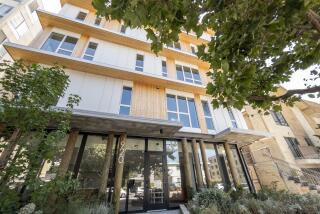Drivers go shopping
- Share via
For a while last week, buyers lined up to drive shiny new cars off the lots at auto dealers in California, just as they did in the old days.
At the massive Norm Reeves Honda dealership in Cerritos, general manager Brad Mugg sounded almost euphoric as he glanced through the numbers and tallied them up: In the week before Wednesday’s hike of one percentage point in the state sales tax, 90 cars that would otherwise have sat unpurchased were snapped up by buyers intent on saving the extra money.
“Everyone was trying to beat the tax hike,” said Mugg, whose dealership is a linchpin of Cerritos Auto Square, the world’s largest auto mall, a collection of more than two dozen dealers spread across 100 acres of former dairy lands alongside the 605 Freeway.
That amounted to a 30% to 40% bump in sales at his establishment, he said.
Unfortunately, there was some symmetry to that figure, since sales have been off by about that much, he said, for months now.
The extended drop-off in car sales has decimated dealers and rumbled through the rest of the economy. And, less obviously, it has also cost cities across California millions of dollars in much-needed sales tax revenues.
Coupled with lowered income from property taxes, the sales tax decline has worsened the fiscal drought among California’s governments, and one week of rain made for little relief.
Fiscal planners in California’s cities could be forgiven for wondering where to turn next.
Their primary mechanism for funding government, the property tax, was sharply limited by 1978’s Proposition 13. The visionaries in the field of municipal funding then turned their sights to the sales tax, ushering in decades when cities engaged in pitched disputes over big-box stores and auto malls sprouted next to freeways. (The better to advertise their wares.)
This recession’s irony: The very cities that did the best job luring sales tax benefactors to their cities are now suffering the biggest declines in income, riding the spiral of contraction along with the rest of the country.
Cerritos is practically legendary in the field of squeezing out the dollars it needs, with huge help from sales taxes generated by its shopping mall on the east side of the 605 and the auto mall on the west side.
The national recession has taken its toll, according to Cerritos Mayor Bruce Barrows. Receipts from the auto mall were down 36% in the fourth quarter of 2008, compared to a year earlier. Sales taxes from other sources were down 11%, he said.
The money pays for the contract with the Los Angeles County Sheriff’s Department to patrol the city and helped build a new substation; it pays for the city’s bountiful parks and its tree-lined streets, for its nationally recognized, architecturally stunning library and for the city’s Center for the Performing Arts, which otherwise would operate at a loss.
“Money from the Auto Square helps subsidize every ticket,” Barrows said.
The recession became obvious to city leaders a year ago, and since then they have taken pains to limit the damage. A hiring freeze went into effect and a minimal amount was taken from the city’s reserves, swollen from the good years.
The city is crossing its fingers in hopes that developments now underway will proceed without complication: an addition to the shopping mall, a new office building near the performing arts center and a hotel and restaurant complex nearby.
It also has its sights set on the national stimulus package pushed through Congress by President Obama.
Barrows said city staff members jumped at the chance to win stimulus grants and have corralled four or five already.
“The money is going to be given out somewhere,” he said. “If we don’t go after our fair share. . . . “
For Cerritos and other cities, receipts in the coming weeks will show how much was gained in big-ticket purchases made in the days before the sales tax hike took effect. (Except in a handful of cities, the sales tax rate in Los Angeles County stands at 9.25%. The extra revenue goes to pay off the state’s deficit and will not be shared with cities.)
Right now, it is an open question whether the spurt of purchasing was a last gasp from consumers desperate to save hundreds of dollars in taxes or represents the beginning of a return to more normal spending. Mugg, the Honda general manager, said he hopes the recent sales will propel dealers through the usual selling seasons of spring and summer.
“People are starting to get some comfort level back,” he said.
There are continuing concerns: Several of the dealers at the Auto Square sell cars whose manufacturers are teetering on the edge; their departure would hurt the city’s bottom line. Continued economic decline nationally would have a broader effect on all the dealers.
But for this week, the bump in sales was enough to feed a glimmer of optimism and to confirm the decision to lure the dealers there in the first place. When people start buying again, Mayor Barrows said, they will return to Cerritos.
“We are very much an entrepreneurial city,” he said. “We look at taking risks that are reasonable.”
Each Sunday, The Week examines one or more of the previous week’s major stories and their implications for our state or our region. Previous editions of The Week are archived online at latimes.com/theweek.
More to Read
Sign up for Essential California
The most important California stories and recommendations in your inbox every morning.
You may occasionally receive promotional content from the Los Angeles Times.










